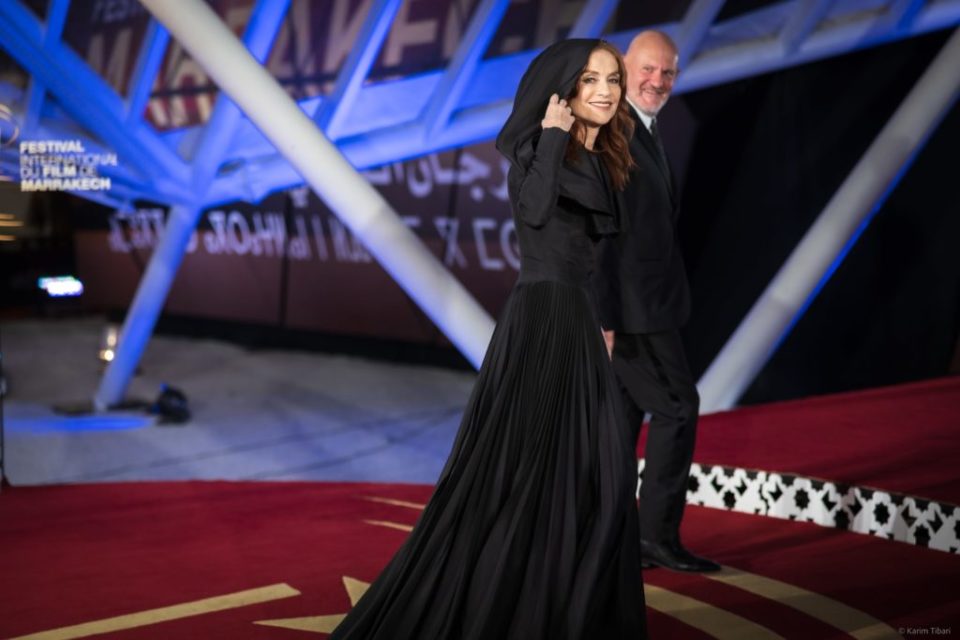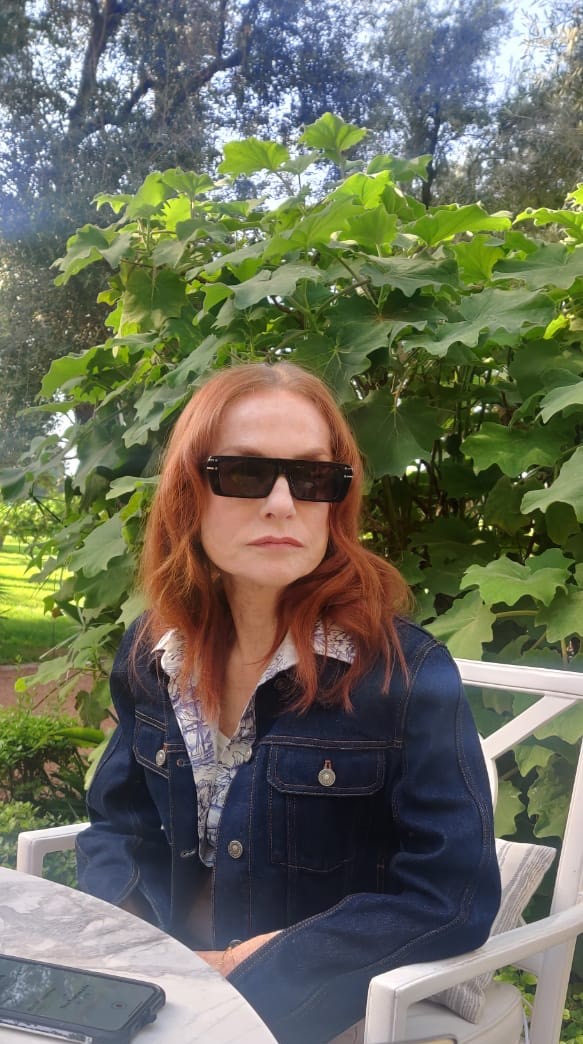‘To Get Into a Character, You Don’t Need Time, You Need Talent’: Isabelle Huppert
The French actress opens up about her craft and how she’s talked with director Ritesh Batra about working together with him at some point
How should the greatest living actress of our time play the role of a woman who may or may not have lied about being attacked and raped in her own house?
With raging feminist certitude or as an actress who swears allegiance to the art and mystique of cinema?
French actress Isabelle Huppert, the star of Jean-Paul Salome’s film, The Sitting Duck, says she wasn’t really interested in finding out the truth to play the real-life character of Maureen Kearney, a union representative at the French nuclear giant Areva who was attacked in her home in 2012 while she was opposing a nuclear reactor deal with a Chinese consortium.
“I think cinema is mainly about what you hide as much as what you show. What you hide lets people’s imagination travel… It’s more interesting to raise questions,” says Huppert, who is in Morocco to attend the Gala screening of her film at the Marrakech International Film Festival that runs from November 11 to 19.

Based on La Syndicaliste (The Union Official), an investigative book by journalist Caroline Michel-Aguirre, The Sitting Duck tells the story of Kearney who was discovered in her Paris home by her cleaning lady. She was bound to a chair, gagged, had a knife between her legs and the letter “A” was carved on her stomach. Police investigated the case but accused her of faking her own rape. Kearney is still fighting to clear her name.
But clarity can turn characters into clichés and Huppert, who has honed and mastered the art of keeping her characters delicately grey and edgy, says that she likes characters complicated, even in her head.
“Sometimes you come up with these imaginary constructs which are not so close to the character, [but are] help you get inside the character… I had an imaginary construct in my head, especially in the first trial when she [Maureen Kearney] starts weeping and weeping. And I thought maybe she’s crying because she made it up,” Huppert says during a conversation with four journalists on the sidelines of the Marrakech Film Festival.
In The Sitting Duck, Huppert’s Kearney often feels like a victim, twice over. But sometimes her actions make her seem like a woman who may be lying. And then there are moments when we are shaken by her vulnerability as she desperately tries to hold on to her sanity while fighting the sexist suspicion cast over her trauma.
In a scene somewhat reminiscent of Michèle Leblan, the character she played in director Paul Verhoeve’s 2013 film, Elle, as soon as Huppert’s Kearney gets done with a rather intrusive gynecological examination, she applies lipstick, over and over again, while still in a hospital robe.
“I don’t feel any big responsibility,” Huppert says about playing real-life characters. “I just feel the responsibility of being as good as I can. I’m just an actress, you know, nothing more,” she says, and then adds, “Nothing less, but nothing more.”
5.1 feet of invisibility
En route to interview Huppert, I met a Belgian journalist who had interviewed her earlier.
“Impenetrable,” he said when I asked him what she’s like, and then added that she is too old to play the roles she has been taking on lately.
For the 11 am meeting in the sunny, lush garden of Marrakech’s luxurious and historic 100-year-old La Mamounia hotel, Huppert arrived on time dressed like a teenager. She had black nail polish, a printed white-and-blue collared shirt was tucked inside wide-bottom beige pants, and she wore a denim jacket whose cuffs were undone.
Huppert is 69, five foot-one inch tall, very sharp, direct and gently assertive. She carries around her an air of amused aloofness and formality. That gives her petite frame the persona of invincibility. It’s daunting and very sexy.
In many of the roles Huppert has done, I have been stunned by how her face remains stoic, doggedly haughty even, leaving her body to do most of the talking.
I want to ask her if, over the years, changes in her body have changed or impacted her acting. I begin my question thus: “You know, women’s bodies undergo a lot of change…” But before I can complete the sentence, Huppert looks straight at me and says, “Not mine.”
Everyone laughs and moves on to the next question.
‘But even in English it’s Upaer’
Multilingual, Huppert is fluent in English and Italian, and speaks a bit of Arabic. But because she is particular about the words she uses to express her thoughts, she prefers the comfort of French and during our 40-minute conversation kept breaking into it, leaving me to grab at the few stray words I could understand — “Godard”, “mise-en-scène”, “Godard” again.
We were about 15 minutes into our conversation when the sun moved and began shining directly on Huppert’s face. She kept sipping water, putting on and taking off her dark glasses till a journalist from Greece, whose chair was in the shade, swapped places with her.
She liked that moment of chivalry, but insisted that her surname be pronounced correctly.
“My name is Upaer,” she says, correcting a young Moroccan journalist who mispronounced her surname – it’s Huppert with a silent “h” and silent “t”.
And when the journalist winced a little and said something to the effect of, “It’s the hazard of juggling English and French,” Huppert giggles and adds, “But even in English it’s Upaer”.
Issues don’t tickle Huppert’s interest, cinema does
Huppert, who has been acting since 1972, has done over 120 films, and played the biggest and best characters on stage, including Mary, Queen of Scots, Isabella in Shakespeare’s Measure for Measure, the eponymous Orlando and Hedda Gabler, and even Blanche DuBois in Tennessee Williams’ A Streetcar Named Desire.
And even after so many years and so many roles, she still loves the process, the routine and rituals of acting.
“Even the repetition of ‘Camera rolling, action, cut’ is the same, it hasn’t changed,” she says with palpable affinity.
Huppert says she always has fun acting and enjoys the process of picking the roles she plays.
“It’s a game, a nice game, because you explore and try to find the treasure…that little glitter,” she says.
That special thing she seeks in characters is not just complexity — of situation and personality — but also how cinematic it will be.
“The idea of cinema is sometimes kind of threatened… [There’s fear] that cinema will disappear because now people are mainly interested in subject matters. Okay, even my film [The Sitting Duck] is a strong subject, politically, economically… But what’s really important if you make films is how you turn it into a real cinema statement. Godard was a pessimist, and that pessimism, that cinema is threatened, is important,” she says and breaks into French, again.
Huppert says she doesn’t seek out directors because “there’s nothing I want in particular.”
“I have the desire to be in great films… American, French, Moroccan,” and pointing to me, adds, “Indian.”
Does she get a lot of scripts from non-French, non-Hollywood directors? Not a lot, she says, and then adds, “There is an Indian director I like very much, Ritesh Batra. We met here, at the Marrakech Film Festival. I like his work very much. And we talked about working together at some point.”
So, is something in the pipeline?
“Well, maybe it will happen, maybe not. Who knows?”
‘I’m a very good spectator, besides being a very good actress’
Huppert speaks of her acting prowess and talent with naughty lightness, but it’s not to be taken lightly.
Her self-esteem is high, her confidence is irresistible and everything she says is underlined with lots of amour-propre.
When asked how she manages to act in so many films every year, that too playing “tricky” characters in most of them, she answers with the casual nonchalance of a veteran thespian. “I never find anything I do tricky. For me it’s very, very easy. I have fun all the time. Acting is not so difficult actually,” she says and adds that to get into a character, “You don’t need time, you need talent.”
But she then pauses and adds that sometimes being a spectator can be more difficult than being an actor, and gives the example of her role as the sexually repressed Erika Kohut in Michael Haneke’s 2001 film, The Piano Teacher.
“It’s quite disturbing to watch as a spectator, but it’s fun to do as an actor. I’m a very good spectator myself besides being a very good actress,” she says with a laugh and adds, “I’m kidding.”
She wasn’t kidding.




